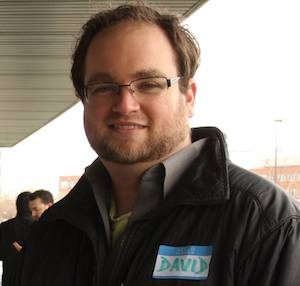 Hometown Plantation, FL
Hometown Plantation, FL
Undergraduate school/major Northwestern/Civil Engineering followed by a J.D.; Florida State University – Environmental & Land Use Law
Why did you decide to pursue planning as a career?
Cities are these marvelously complex systems full of people with their own desires and their own motives. The more I studied engineering, the more I reveled in work with that sort of scale and impact. You give up the control to proscribe a precise bolt or beam but the end result seemed much more rewarding.
What made you decide to come to the GSD?
I attended Career Discovery in 2009 where the GSD was my first in-depth encounter with planning, so it was always high on my list.
I also wanted a program that would teach me to weave a strong design component into technical skills.
What are your main interests in planning and concentration area?
Building better cities is a way to help that massive elephant-in-the-planet issue of climate change—both by helping communities cope and by easing our demands on the planet. Given my background, I pursued a concentration is in Urban Design to add to my toolkit a different way to achieve those ends.
What was your impression of Harvard and the GSD before you came?
It is a very connected place. You’re connected to your peers in the trays. The school is connected to the community and prominent alumni hold positions throughout Cambridge and Boston, and there is a wealth of additional resources at the other Harvard schools at your disposal.
How has your impression changed since coming to the GSD?
I suppose I realized the GSD can stand alone as its own incubator in its own right. You could spend months only moving between your home, Gund, and the occasional trip to a market. A few people do, but the effort to reach outward is well worth it.
Are you involved in any student groups? What have you gained from the experience?
I am involved in the Harvard Urban Planning Organization. HUPO creates additional social and educational interaction among the students. The diversity of talents to be found from a pool of fewer than 100 planning students on campus is astounding, and HUPO events are just another avenue to make the bond tighter and to learn from and appreciate those around you.
What has been your favorite class or project? Why?
The community outreach portion of second semester studio was an incredible experience. Our final plan was for the benefit of the Chelsea, MA community, and in the opening weeks of studio, my classmates and I canvassed the study area trying to figure out what people were worried or hopeful about and what made the area tick. I would go to walk a street to understand it or follow up on an interview and would up running into other MUPs with their own investigations. The presentation at the end of that segment energized me for the coming task of proposing policies and improvements.
What did you do over the summer? How did that add to your education and goals?
I worked in Boston for cultureNOW, a group out of New York that catalogues art, architecture and historical sites around the country, bringing the information to a central registry and map. They grew when responders realized how useful the database was after disasters for figuring out what long-term cultural value was hidden by the cleanup. It was a chance to further broaden my understanding of the many pieces of urban planning.